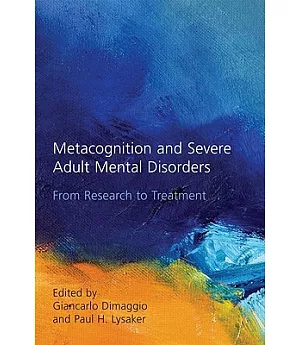"Traditional cognitive domains, such as language, memory or perception, do not properly capture the problems experienced by people with severe mental disorders like schizophrenia. In this book
the editors have recognised that these disparate problems can be brought together under the heading of Metacognition. As the contents of the book so admirably show, this very important insight
provides a framework for guiding both theory and practice in the study of severe mental disorders." -Chris Frith, University College London, UK and University of Aarhus, Denmark
"Dimaggio and Lysaker have assembled a stellar cast of contributors who apply the latest developments in theory and research on metacognition to our understanding of both the development and
treatment of severe mental disorders. The end result is a lively, engaging and thought provoking collection of essays that will be of tremendous interest to theorists, researchers and
psychotherapists of all orientations."-Jeremy D. Safran, Professor and Director of Clinical Psychology, New School for Social Research, President, International Association for Relational
Psychoanalysis and Psychotherapy, New York, USA
Many adults who experience severe mental illness also suffer from deficits in metacognition 羶 put simply, thinking about one's own thought processes 羶 limiting their abilities to recognize,
express and manage naturally occurring painful emotions and routine social problems as well as to fathom the intentions of others.
This book presents an overview of the field, showing how current research can inform clinical practice. An international range of expert contributors provide chapters which look at the role of
metacognitive deficit in personality disorders, schizophrenia and mood disorders, and the implications for future psychotherapeutic treatment.
Divided into three parts areas covered include:
how metacognitive deficits may arise and the different forms they might take
the psychopathology of metacognition in different forms of mental illness
whether specific deficits in metacognition might help us understand the difficulties seen in differing forms of severe mental illness.
Offering varying perpsectives and including a wealth of clinical material, this book will be of great interest to all mental health professionals, researchers and practitioners.





















